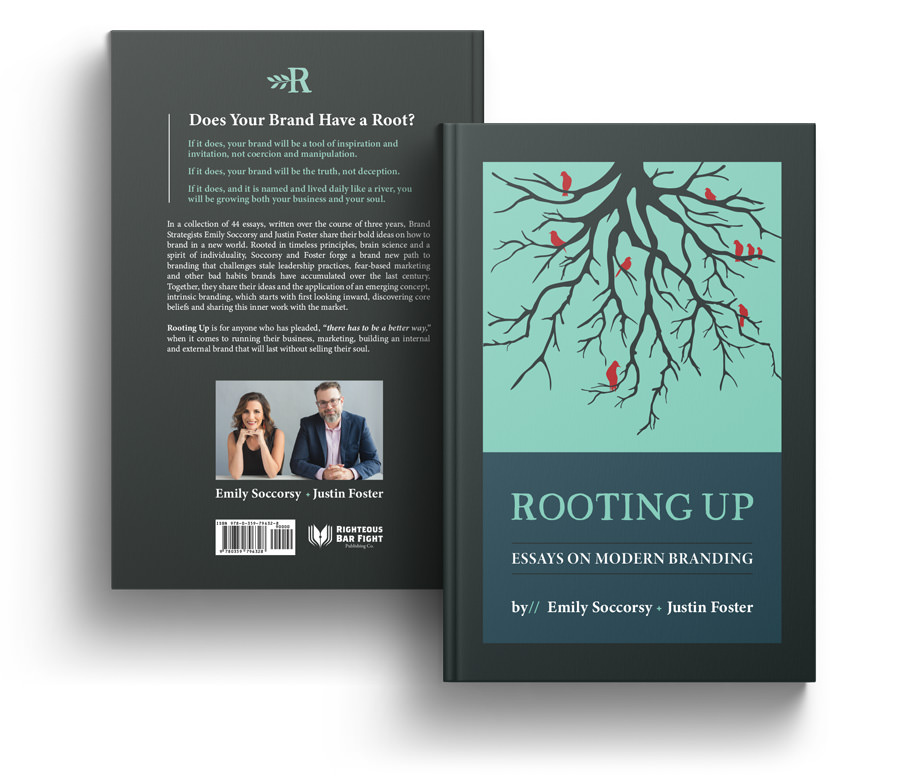Filed Under: 21st Century Branding, Beliefs-Based Branding
By Emily Soccorsy + Justin Foster
The most stubborn remnant of 20th century thinking is that you can move people by moving their brains. And that messaging is merely an intellectual exercise.
It’s not true. Not scientifically speaking, not realistically speaking, not spiritually speaking.
And yet, so many leaders remain determined to show that analytical case building will incite action. That just one more white paper, one more research project and one more committee to answer the question, “What is our message?” will finally cause the masses to rise up and make your brand famous.
Rather than replay this record ad nauseum, we began to ponder why this dead-wrong thinking still exists. And how frustrating it must be for modern thinking directors of marketing to deal with it on a daily basis.
So why? Why is this still a thing?
To get ahead, many leaders committed their careers to the worldview that everything can be explained and justified intellectually. When Time Magazine declared in 1966 that “God is Dead,” they believed it. They readily embraced the idea that behavior is just a series of levers to pull. They believed the most important takeaway from the 1963 Milgram experiments was that obedience to authority would work as a strategy in business. They became Gordon Gecko/Glengarry Glen Ross devotees, even though both are works of fiction.
Since that era, most of these types of leaders have now retired. Yet their disciples remain in three current leadership archetypes:
Up In Their Head: For the most part, Up in Their Head leaders are well-intentioned. They’re just too damn smart for their own good sometimes. They feel things for people, but do not apply feelings to ideas. They love to think, and think, and think — and then think some more. These leaders can be reached by reminding them of their heart and that their heart is the driving force of decision-making. If they still don’t believe you, you can show them the boatload of science and give them something more to think about.
Filled with Dread: Continually confronted with too much change, too fast, and too soon, intellectual arguments are the safest place for them to go. They are quick to point out that back in the early 1990s, one time with one campaign they made an intellectual argument that sort of worked. They have likely read every book they can find on persuasion and motivation and some variation of Ten Tips for Getting People to Do Stuff They Don’t Want To Do. The passive audience that was unaware they were being manipulated really does not exist anymore, except during political campaigns. The easiest way for them to deal with their own dread is to pass it on to you.
Spiritually Dead: The dark truth is that people like this should not be in places of leadership. They kill brands, cultures and houseplants. And they have a propensity for bad hair and pantsuits. We try to have empathy for them, we really do. But we mostly have empathy for the people who work for them. We want to send a “Wake-The-Hell-Up” card to the leader and a “Hang In There” card to their people and their customers. Being Spiritually Dead is the result of detachment, investment in the myth of the “ownership mentality,” and the retention of power via status quo. The most malicious impact is their view that people are simply company assets and should be treated as such.
Thankfully, most of us do not fall into any of these categories. But we likely come into near or far contact with them on a regular basis. So how do we deal?
- Become well-read on the science of decision making, how habits form and how real change happens.
- Understand the movements begun by Ghandi, Martin Luther King and Jesus were not fueled by intellectual arguments, but by love.
- Arm yourself with quiet and challenging questions such as, “How do you know that’s true?” “What do you mean by that?” “Who has that worked for lately?”
- Don’t become them no matter what beverage they bring you from the bar or how tasty they say the Kool-Aid is.
- Fight their lack of soul with your soul on fire. Be unapologetic in your desire to speak from the heart to the hearts of others.
- Reject and reject again their attempts to minimize, rebuke and trample on others’ dreams.
- Be a bliss burr in their saddle of sadness.
And if they want you out, then fight like hell, stir up trouble, and if you lose, exit with grace. Knowing that the war is always more important than the battle.
Then go work for an Opt-In leader or lead an Opt-In organization and go be you.
Emily Soccorsy + Justin Foster are cofounders of the intrinsic branding practice known as Root + River. Together with their defiantly different clients, they uncover then articulate the foundational elements of the brand. Then, they provide brand strategy and brand coaching as the brand is rolled out internally and externally. Obsessive about language and differentiation, Emily + Justin are also authors and speakers. Follow @rootandriver @fosterthinking and @emilyatlarge.
